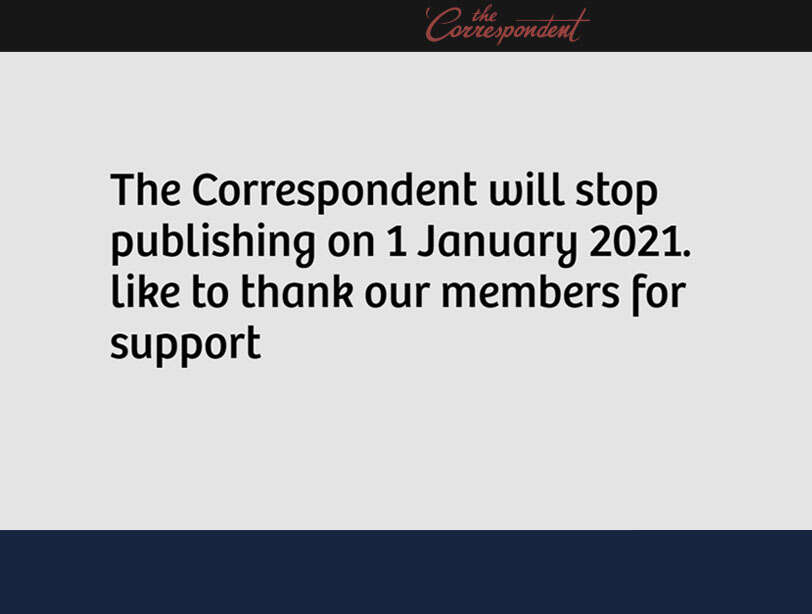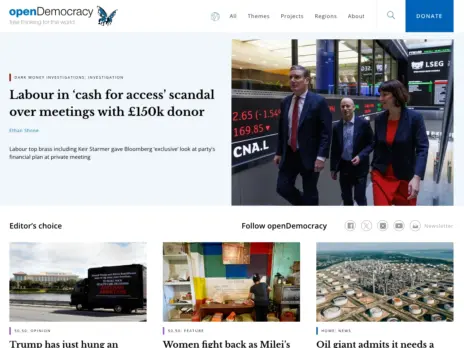
Reader-funded journalism website The Correspondent is closing two years after launching a $2.6m crowdfunding campaign and just over a year since starting to publish content.
The news website’s chief executive Ernst-Jan Pfauth and founding editor Rob Wijnberg said their set-up had become “financially unsustainable”.
They said the Covid-19 pandemic had played a “significant role” in the closure because their set-up was designed to avoid the daily news cycle and focus on longer-term structural developments around the world.
Ten staff members will lose their jobs when the website closes at the end of the year. The site had correspondents based in the UK, US, Nigeria, India, Italy and Argentina.
The English-language The Correspondent was launched by the team behind the Dutch De Correspondent, which began in 2013 and is set to continue. Any staff that worked part-time between the two sites will keep their jobs.
Pfauth and Wijnberg said: “Unfortunately, we were unable to demonstrate the value of The Correspondent’s journalism to a significant enough number of members.
“With the Covid-19 pandemic dominating headlines non-stop for much of the year, it proved very difficult to offer ‘unbreaking news’ to members in over 140 countries. People want to know from their media source: ‘Is my kid’s school going to be closed tomorrow and when will I be eligible for a vaccination?’
“While essential, this is not the kind of journalism we were set up to do. We were focused instead on transnational issues.”
The ad-free website has a choose-what-you-pay model, with the latest published member count at 20,000 – down from 50,000 at launch.
Pfauth and Wijnberg said there had been a “marked increase” in cancellations in the past three months with many members saying they could no longer afford it.
The average membership fee “also lagged behind budgetary needs”, they said.
The website also had investment from The Democracy and Media Foundation and philanthropic organisation Luminate.
The English launch was mired by controversy after ambassadors and others who supported the site early in its crowdfunding campaign said they felt misled when it emerged the website would not be based in the US with a New York office and team of journalists as originally advertised.
Instead, the website eventually admitted in a statement that it had changed its plans and that this was poorly communicated to its ambassadors, who included prominent figures such as FiveThirtyEight editor-in-chief Nate Silver and The Wire creator David Simon.
In an unsigned statement, the website said at the time: “We failed to give adequate insight into what we mean by ‘global platform’, leaving the impression we would be ‘US focused’.
“For a site that speaks in terms like ‘optimised for trust, there are serious errors. We offer our unconditional apology.”
It also emerged that the site raised $1.8m in “runway funding” ahead of raising its $2.6m in crowdfunding, according to Nieman Lab.
In September the website revealed it had received €124,000 (about £112,000) in new membership fees in its first year of publishing with an average annual membership fee of €43 (£39) and monthly fee of €4.20 (£3.80). It said it had not yet begun to break even.
According to Nieman Lab, staff were told in a memo on Thursday that its three worst-case scenarios had all happened, leading to a projected loss of €900,000 (£814,741) in 2021 against €1m (£905,268) in revenue.
They were: less than 30% of renewals from founding members, an increase of churn up to 25% for annual members with many citing financial difficulties and Covid-19, and a lower-than-anticipated average membership fee.
The Dutch De Correspondent has more than 70,000 members and Pfauth and Wijnberg said it remains financially healthy.
They said they believe there is a market and a need for their slower type of journalism but that “we were not able to make it work in this climate”.
They explored options including cutting the size of the team, making salary cuts and merging with De Correspondent but said none of these were financially feasible.
Lessons learned

Chris Waiting, chief executive of The Conversation UK
Chris Waiting, chief executive of the academic-led website The Conversation which was often confused with The Correspondent because of its similar name and ethos, said he was sorry to hear of the site’s closure and the loss of journalism jobs and shared some learnings.
“Firstly, it’s good to experiment,” he said. “While The Correspondent didn’t work out, lessons from its approach will help other news organisations find a path to sustainability.
“For better or worse, we can all learn from its membership model, its policies on transparency and how it let readers see under the hood of its journalism.
[Read more: The Conversation chief exec Chris Waiting on how pandemic has boosted readership and revenue]
“Secondly, there is a viable, reader-supported model for a new type of journalism. The excitement around its crowdfunding campaign shows there’s an audience who are hungry for high-quality news and who are willing to contribute towards it.
“Publications like Tortoise or the Texas Tribune have shown compelling content is key to attracting and retaining these readers. The Conversation’s UK edition alone received more than £125,000 from our readers in 2020, for which I am incredibly grateful, more or less the same amount that The Correspondent brought in from its members.
“However, The Correspondent also shows we must keep our promises to readers. When its members felt they’d been mis-sold what the campaign had implied, they didn’t stick around.”
Waiting added that The Correspondent’s closure shows news outfits need to “focus on what they do best”.
“The Dutch original, De Correspondent, endures because of its clear focus on its domestic market, filling a gap left by other news outlets,” he said.
“The English language version felt at times poorly defined, unsure who it was writing for, or what it was trying to accomplish.”
Email pged@pressgazette.co.uk to point out mistakes, provide story tips or send in a letter for publication on our "Letters Page" blog






